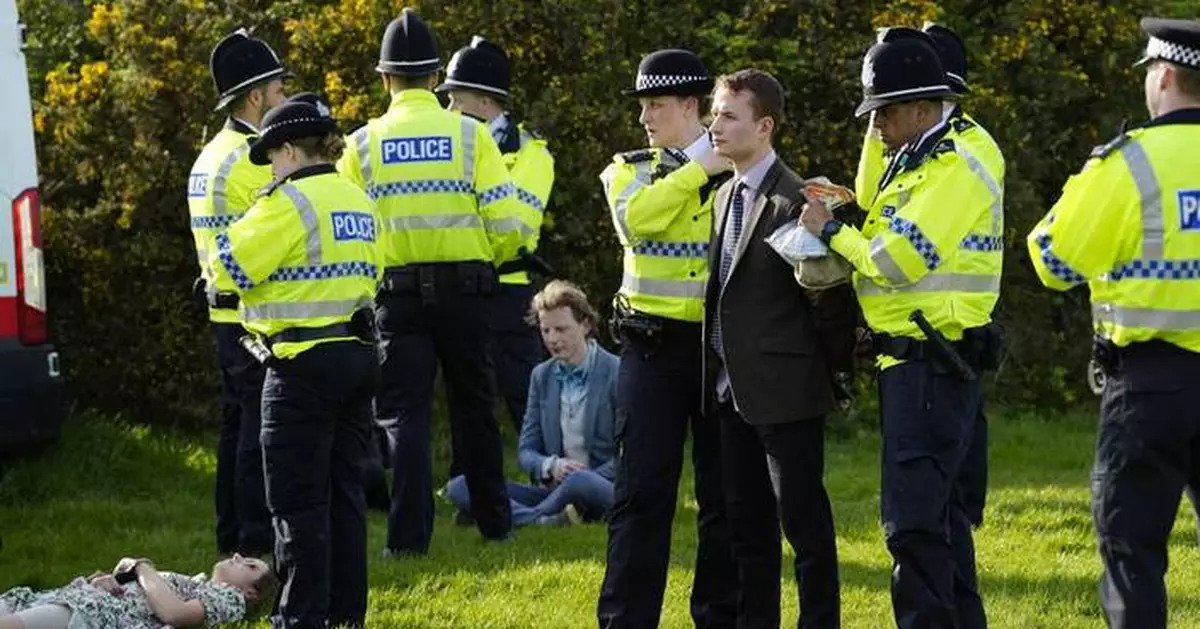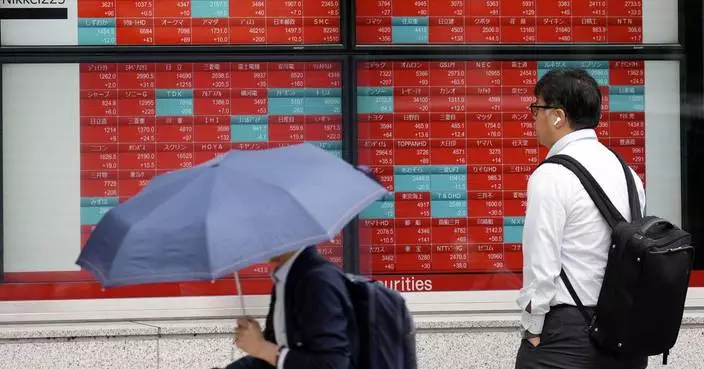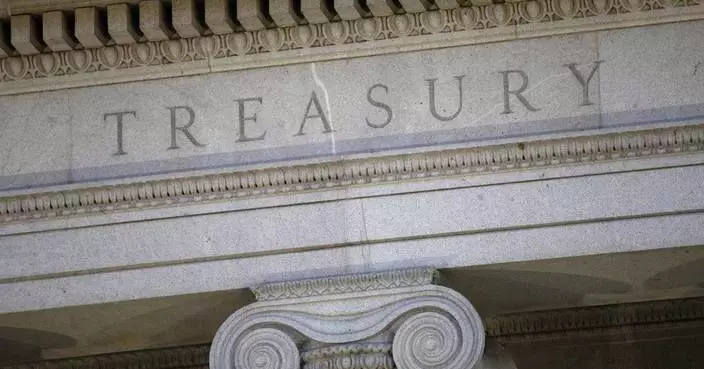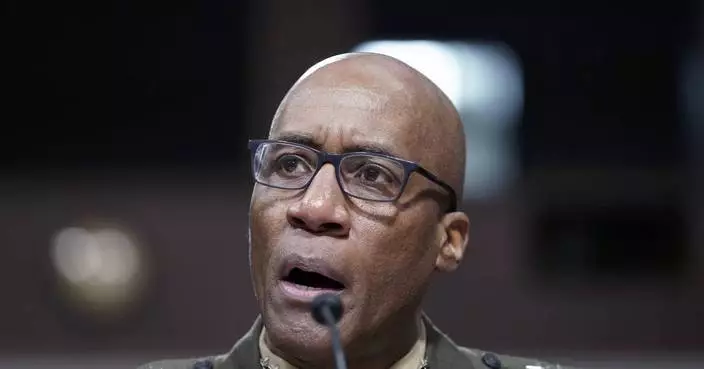There will be a new look to the ever-adapting Grand National Steeplechase this year, with organizers of Britain’s biggest horse race taking action to improve safety and avoid a repeat of the chaos sparked by animal-rights activists before last year’s edition.
The 2023 race was delayed by nearly 15 minutes after campaigners scaled fences around the perimeter of the storied Aintree racecourse and got onto the track, with some affixing themselves to the race fences using glue and lock-on devices.
The tension that built up while police, security and even disgruntled local residents fought to keep the protesters off the course might have impacted the race itself. The horses were made to wait longer in the parade ring, before five fell at the first fence — including one, Hill Sixteen, who suffered a fatal injury — and three more went at the second fence.
The Grand National has long been embroiled in a debate over horse welfare because of the size not just of the huge fences but the field of 40, with 16 horses having died in the race since the turn of the century.
Under constant scrutiny from animal campaigners, the British Horseracing Authority took part in a review that also included jockeys, trainers, officials in the racing industry, as well as insights from independent research papers into racehorse welfare.
Changes coming into effect for this year’s Grand National, which is run on Saturday, see the field trimmed to 34 horses in an attempt to reduce collisions and bunching either side of the fences. The first fence is now 60 yards (meters) closer to the start — an estimated reduction of 5 seconds — to stop horses building up too much speed into the first jump.
The race will also start 75 minutes earlier in the day — at 4 p.m. local time — so the course stays as soft as possible, and the horses will set off from a standing start.
Fences will also be softened using foam and rubber toe boards.
While Animal Rising, the protest group whose campaigners caused the delay to last year’s race, insist the changes do not make the race safe and that the horses are still at risk of coming to harm and being killed, it did confirm to The Associated Press that the group will not be disrupting the National this year.
“We all want to see these horses living happy lives in sanctuaries, not being raced,” said Ben Newman, a co-founder of Animal Rising, adding that “a spotlight was put onto the Grand National” by the group’s actions in the 2023 race.
Away from the course, Merseyside Police are deploying undercover officers at the three-day festival starting Thursday and warned the force will deal “robustly” with any incidents of “anti-social behavior, hate crime, disorder and other criminal activity.” Racegoers have been warned to expect a series of security checks.
“These deployments will appear at any time in and around the area of the racecourse,” the police force said, “but the public should not be alarmed by this.”
Corach Rambler, the 2023 winner, is set to be in the field a year later.
AP sports: https://apnews.com/sports

FILE - Members of the police forces remove protesters as they tried to block the start of the Grand National horse race at Aintree Racecourse Liverpool, England, on April 15, 2023. There will be a new look to the ever-adapting Grand National Steeplechase this year. Organizers of Britain’s biggest horse race have taken action to improve safety and avoid a repeat of the chaos sparked by animal-rights activists before last year’s edition. Among the changes coming into effect for Saturday's race are the field being trimmed to 34 horses in an attempt to reduce collisions and bunching either side of the huge fences. (AP Photo/Jon Super, File)

FILE - Members of the police detain protesters as activists tried to block the start of the Grand National horse race at Aintree Racecourse Liverpool, England, on April 15, 2023. There will be a new look to the ever-adapting Grand National Steeplechase this year. Organizers of Britain’s biggest horse race have taken action to improve safety and avoid a repeat of the chaos sparked by animal-rights activists before last year’s edition. Among the changes coming into effect for Saturday's race are the field being trimmed to 34 horses in an attempt to reduce collisions and bunching either side of the huge fences. (AP Photo/Jon Super, File)
TBILISI, Georgia (AP) — Georgia's parliament on Wednesday moved a step closer to passing a law that critics fear will stifle media freedom and endanger the country's European Union membership bid, as tens of thousands of protesters thronged surrounding streets.
The vote occurred hours after dozens of people were arrested as police overnight used tear gas and water cannons to disperse the latest protest. Protesters denounce the bill as “the Russian law” because neighboring Russia uses similar legislation to stigmatize independent news media and organizations critical of the Kremlin.
The law would require media and non-commercial organizations to register as “pursuing the interests of a foreign power” if they receive more than 20% of funding from abroad. The ruling Georgian Dream party withdrew a similar proposal last year after large crowds protested.
Eighty-three of Georgia’s 150 lawmakers approved the bill in its second reading. A third and final vote in Parliament is needed before it can be signed into law. That's expected in the coming days.
Russia-Georgia relations have been complicated and turbulent since the Soviet Union’s collapse in the early 1990s. Georgia joined international resolutions condemning Russia's invasion of Ukraine, but it also became a main destination for Russians fleeing military mobilization and political crackdowns. Even Georgia's ruling party has seen internal tensions over its neighbor.
The Interior Ministry said 63 people were detained in the latest protest.
On Wednesday, Georgian TV showed Levan Khabeishvili, chairman of the pro-West United National Movement party, arriving in Parliament with bandages on his nose and forehead. Members of Khabeishvili's party said he had been assaulted by police during the protests.
Purple bruising and cuts were visible around Khabeishvili's left eye as he urged fellow lawmakers to scrap the bill.
“If you are not interested in how the leader of the main opposition party has been beaten up, then — for the sake of those young people who were injured, who were hit on the heads and bruised — I want to ask you once more, even though I do not have any hope, withdraw this law,” he said.
Deputy Interior Minister Aleksandre Darakhvelidze alleged at a briefing that Khabeishvili broke through a police cordon the night before and was injured while he “resisted.” Darakhvelidze alleged that protesters and opposition leaders were “constantly committing violence.” Police broke up the protest after demonstrators tried to block entrances to Parliament.
As protesters gathered once more Wednesday, opposition lawmaker Beqa Liluashvili published a live video from the Parliament chamber showing lawmakers shouting and physically confronting each other. One threw a stack of papers at opponents. Others restrained colleagues.
Opposition lawmaker Helene Khoshtaria accused the ruling party of trying to “drag Georgia into Russian influence” and “close off its European future.”
Speaking to The Associated Press outside Parliament, she described authorities’ response to the rallies as “extremely authoritarian" but said it would not dissuade the protesters.
“We do not want the Soviet regime that our parents have experienced," one protester, Kato Salukvadze, told the AP late Tuesday. “I think that everyone should be in the streets and say no to the Russian law and yes to Europe."
Georgia’s President Salome Zourabichvili, increasingly at odds with the governing party, has criticized the bill and vowed to veto it if it is passed by parliament. But the governing party can overrule the veto and ask the parliament speaker to sign the bill into law.
The Georgian presidency, which has notably limited powers, will switch this year from a directly elected position to one chosen by a college of electors that includes members of parliament.

Demonstrators argue with police that blocked them during an opposition protest against "the Russian law" near the Parliament building in Tbilisi, Georgia, on Wednesday, May 1, 2024. Protesters denounce the bill as "the Russian law" because Moscow uses similar legislation to stigmatize independent news media and organizations critical of the Kremlin. (AP Photo/Zurab Tsertsvadze)

Demonstrators blocked by the police wave a EU flag during an opposition protest against "the Russian law" near the Parliament building in Tbilisi, Georgia, on Wednesday, May 1, 2024. Protesters denounce the bill as "the Russian law" because Moscow uses similar legislation to stigmatize independent news media and organizations critical of the Kremlin. (AP Photo/Zurab Tsertsvadze)

Police face demonstrators during an opposition protest against "the Russian law" near the Parliament building in Tbilisi, Georgia, on Wednesday, May 1, 2024. Protesters denounce the bill as "the Russian law" because Moscow uses similar legislation to stigmatize independent news media and organizations critical of the Kremlin. (AP Photo/Zurab Tsertsvadze)

A woman shows a heart standing in front of riot police during an opposition protest against "the Russian law" near the Parliament building in Tbilisi, Georgia, on Wednesday, May 1, 2024. Clashes erupted between police and opposition demonstrators protesting a new bill intended to track foreign influence that the opposition denounced as Russia-inspired. (AP Photo/Zurab Tsertsvadze)
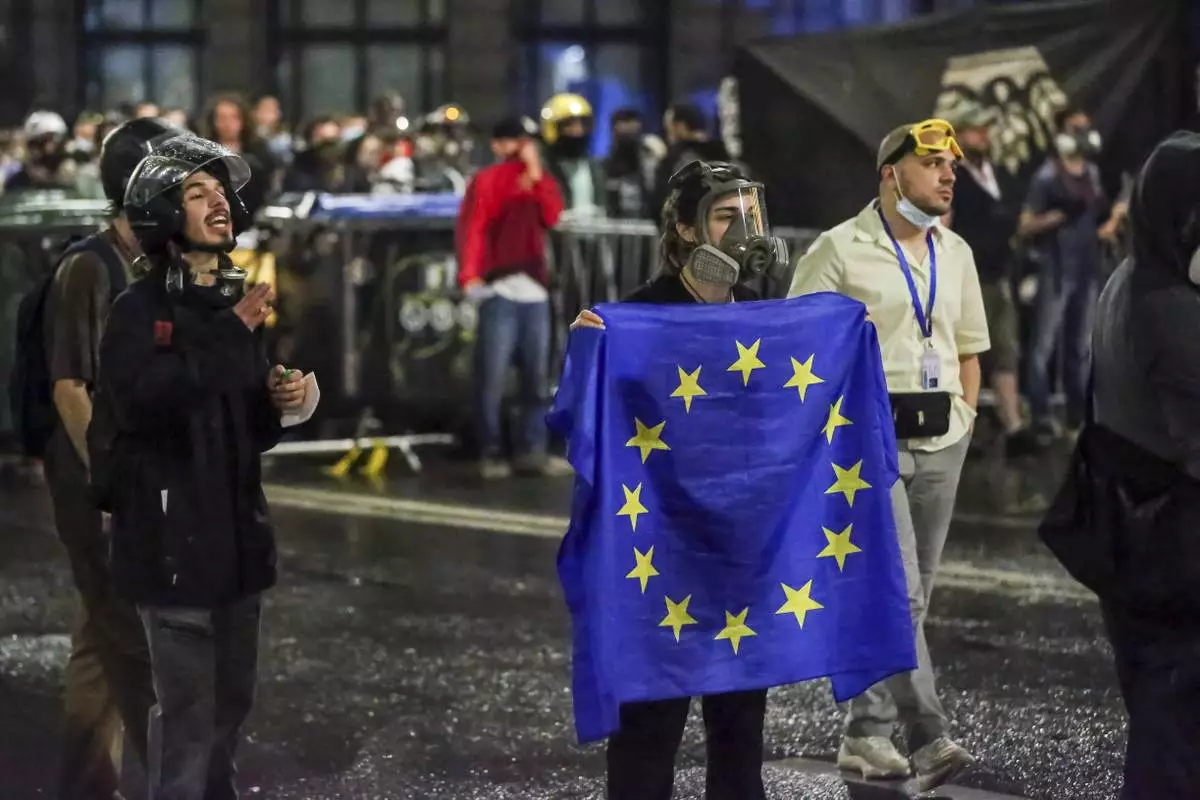
A demonstrator stands with a EU flag in front of police block during an opposition protest against "the Russian law" near the Parliament building in Tbilisi, Georgia, on Wednesday, May 1, 2024. Clashes erupted between police and opposition demonstrators protesting a new bill intended to track foreign influence that the opposition denounced as Russia-inspired. (AP Photo/Zurab Tsertsvadze)
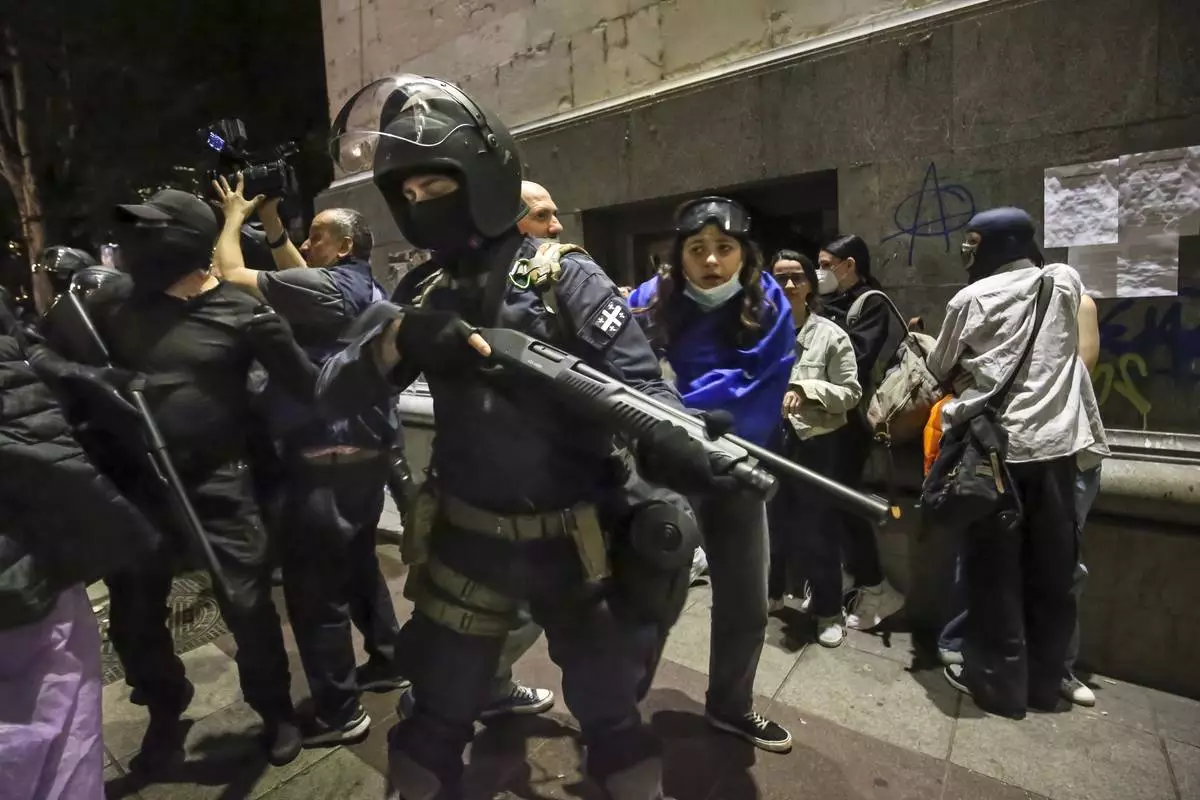
Riot policemen stand ready to fire gas grenade during an opposition protest against "the Russian law" near the Parliament building in Tbilisi, Georgia, on Wednesday, May 1, 2024. Clashes erupted between police and opposition demonstrators protesting a new bill intended to track foreign influence that the opposition denounced as Russia-inspired. (AP Photo/Zurab Tsertsvadze)
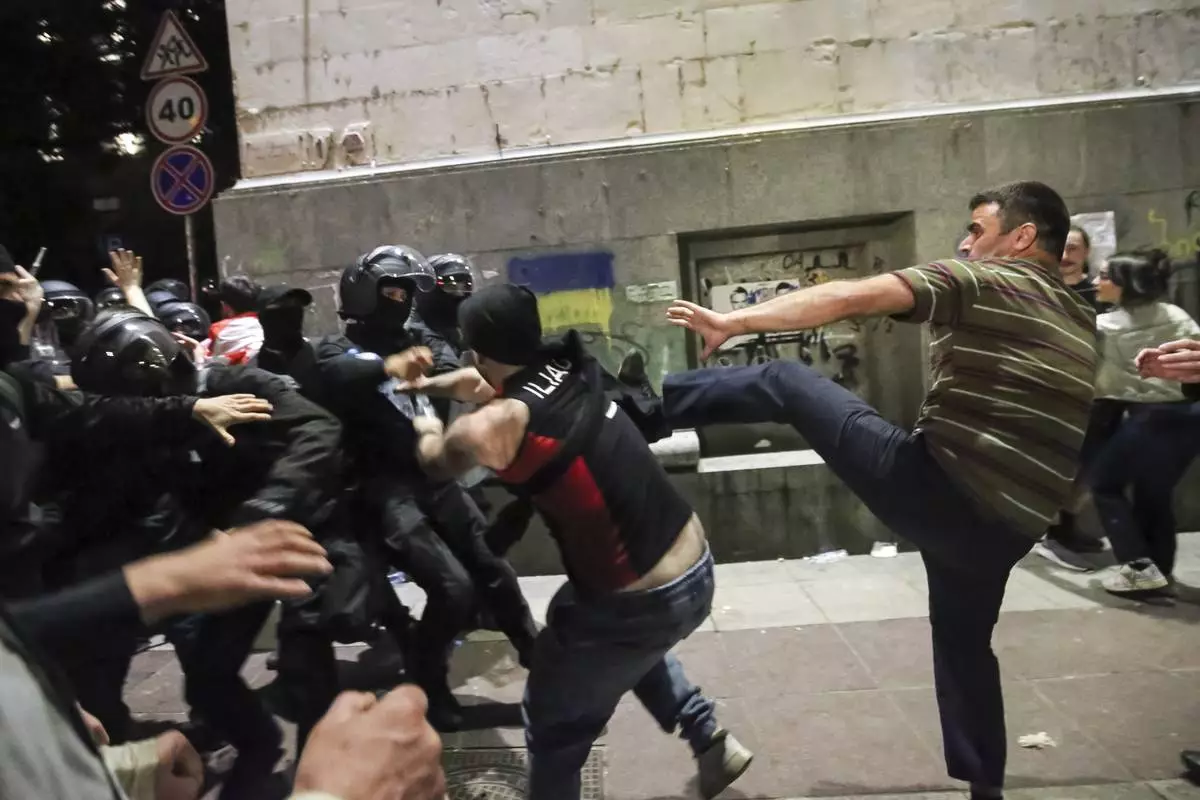
Demonstrators scuffle with riot police during an opposition protest against "the Russian law" near the Parliament building in Tbilisi, Georgia, on Wednesday, May 1, 2024. Clashes erupted between police and opposition demonstrators protesting a new bill intended to track foreign influence that the opposition denounced as Russia-inspired. (AP Photo/Zurab Tsertsvadze)
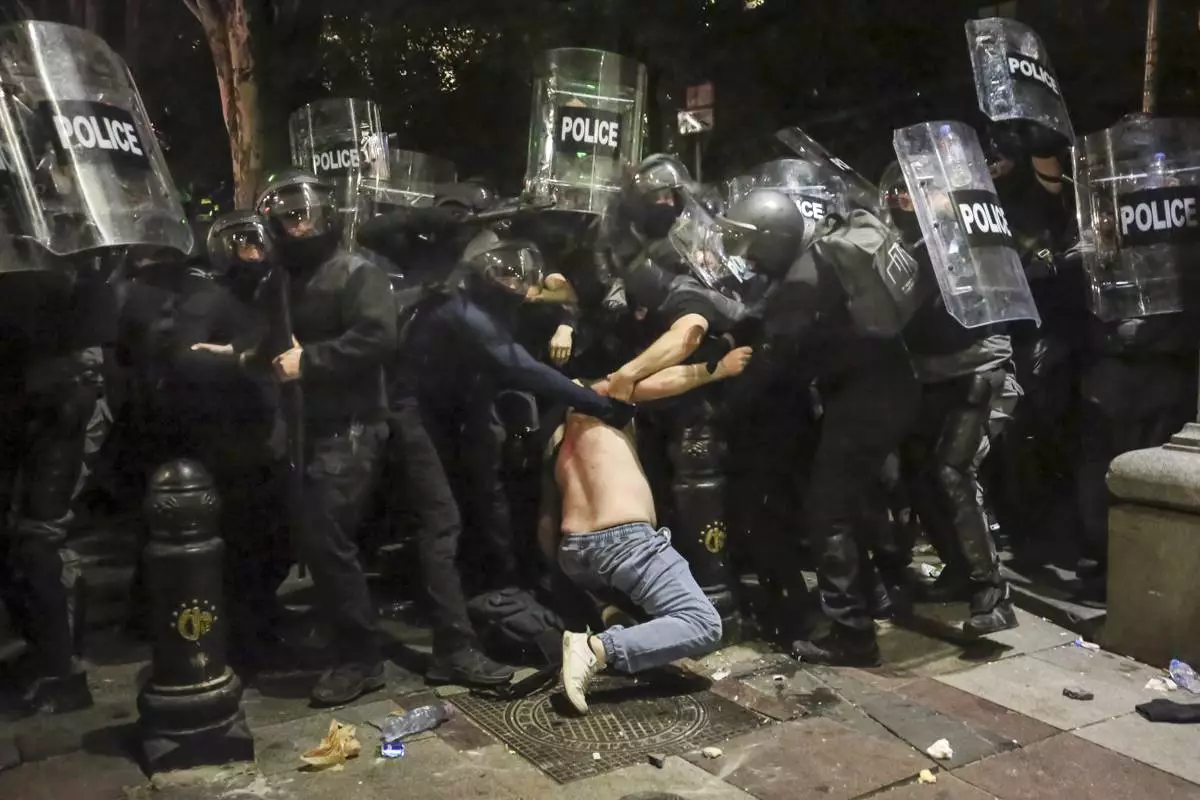
Riot police detain a demonstrator during an opposition protest against "the Russian law" near the Parliament building in Tbilisi, Georgia, on Wednesday, May 1, 2024. Clashes erupted between police and opposition demonstrators protesting a new bill intended to track foreign influence that the opposition denounced as Russia-inspired. (AP Photo/Zurab Tsertsvadze)
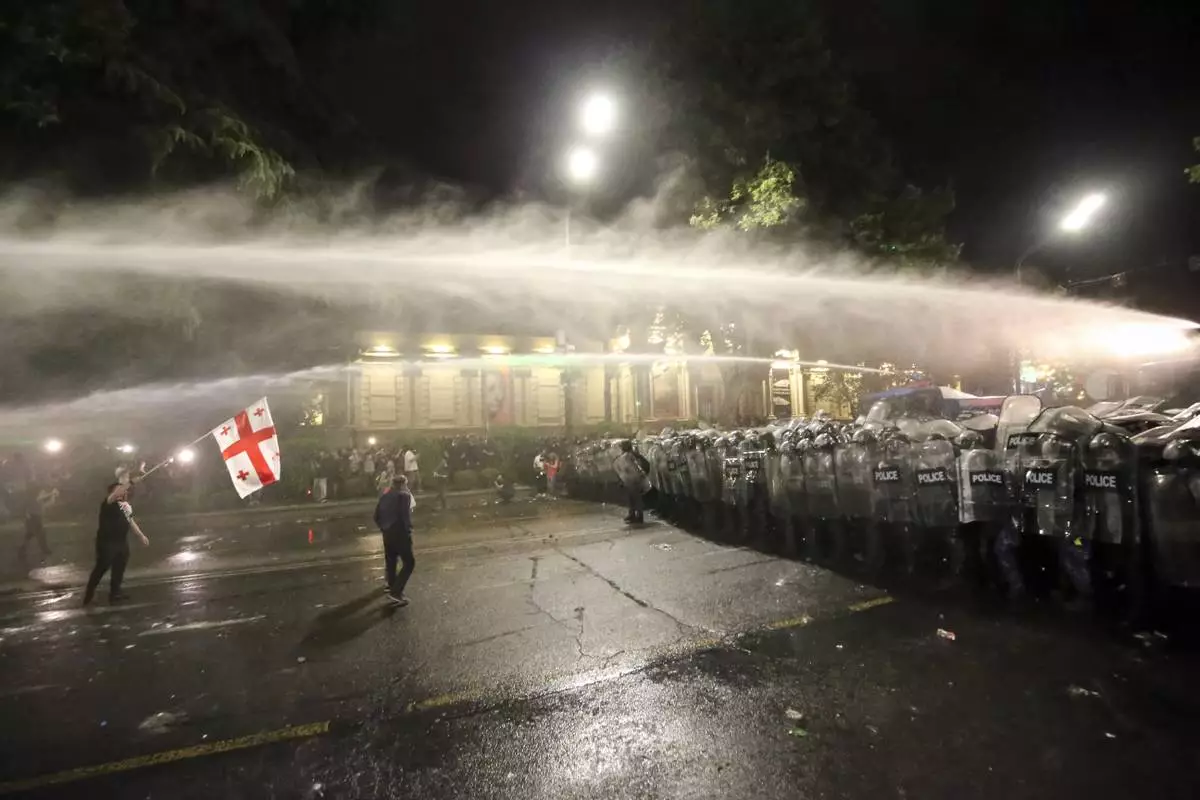
Riot police use a water cannon during an opposition protest against "the Russian law" near the Parliament building in Tbilisi, Georgia, on Wednesday, May 1, 2024. Clashes erupted between police and opposition demonstrators protesting a new bill intended to track foreign influence that the opposition denounced as Russia-inspired. (AP Photo/Zurab Tsertsvadze)
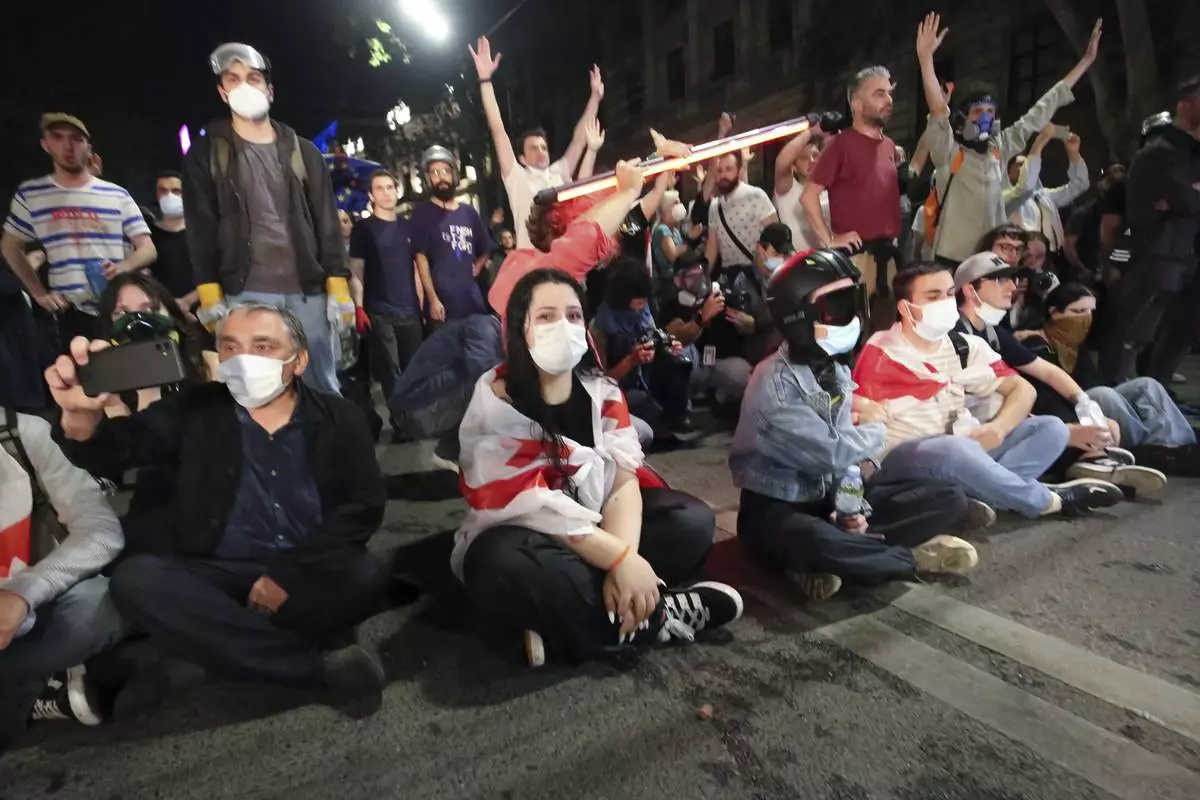
Demonstrators sit in front of police line during an opposition protest against "the Russian law" near the Parliament building in Tbilisi, Georgia, on Tuesday, April 30, 2024. Clashes erupted between police and opposition demonstrators protesting a new bill intended to track foreign influence that the opposition denounced as Russia-inspired. (AP Photo/Zurab Tsertsvadze)




